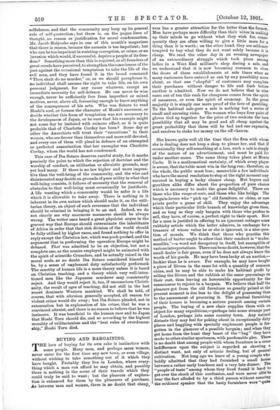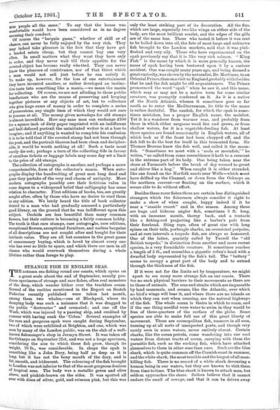BUYING AND BARGAINING.
THE love of buying for its own sake is instinctive with some people. Many men, and perhaps more women, never enter for the first time any new town, or even village, without wishing to take something out of it which they have bought. Probably they live in London, where every- thing which a man can afford he may obtain, and possibly there is nothing in the scene of their travels' which they could truly be said to want ; but the pleasure of explora- tion is enhanced for them by the pleasures of purchase. As between men and women, there is no doubt that cheap_ ness has a greater attraction for the latter than the former. Men have perhaps more difficulty than their wives in makbag up their minds to go without what they wish for, cause. quently they are often willing to give a little more for a thing than it is worth ; on the other hand, they are seldomer tempted to buy what they do not want solely because it is cheap. We read the other day in an evening newspaper of an extraordinary struggle which took place among ladies in a West End milliner's shop during a sale, and we understand that it is now becoming common to close the doors of these establishments at sale times when as many customers have entered as can by any possibility move about, so that one " shopful " of customers may complete their purchases without danger to life and limb before another is admitted. Now we do not believe that in nits cases out of ten this rush for cheapness comes from the spirit of meanness, or even the spirit of economy. In the great majority it is simply one more proof of the love of gambling. To the habitual sale-goer a sale is nothing but .a series of
small and amusing risks. The woman who buys four pairs of gloves tied up together for the price of two reckons the bare possibility that all may be good and all cheap against the great probability that three will be bad and one expensive, and resolves to stake her money on the off-chance.
She knows quite well all the time that the firm with whom she is dealing does not keep a shop to please her, and that if occasionally they sell something at a loss, such a sale is simply of the nature of an advertisement, and must be paid for under another name. The same thing takes place at Monte Carlo. It is a mathematical certainty, of which every player is aware, that the table must win in the long run ; therefore, on the whole, the public must lose; meanwhile a few individuals who have the moral resolution to stop at the right moment may succeed in buying a lucky chance cheap. But buyers and gamblers alike differ about the proportion of pure chance which is necessary to make the game delightful. There are those who like rouge-et-noir, and those who like bridge. The bargain-lovers who " pick up " old furniture, or china, or rare prints prefer a game of skill. They enjoy the advantage which their particular little branch of knowledge gives them, and so long as they only bargain with those who profess to sell, they have, of course, a perfect right to their sport. How far a man is justified in offering to an ignorant cottager some rubbishy article which the latter admires, in exchange for a treasure of whose value be or she is ignorant, is a nice ques- tion of morals. We think that those who practise this method of barter ought to allow that their conduct is " trades- manlike,"—a word not derogatory in itself, but susceptible of various interpretations. There can be no doubt, however, that the small dealer is fair game, even if he does not always know the worth of his goods. He may have been lucky at an aaction,-- luckier than he is aware. For example, he may have bought a piece of Sevres in the same lot with a quantity of common china, and he may be able to make his habitual profit by selling the Sevres and the rubbish at the same percentage on their cost, thus leaving an honourable opportunity for the connoisseur to rejoice in a bargain. We believe that half the pleasure got from the old furniture so greatly prized at the present moment is due less to the delight of possessing than to the amusement of procuring it. The gradual furnishing of their houses is becoming a serious pursuit among certain people. 'The buying of a new chair supplies them with an object for many expeditions,—perhaps into some strange part of London, perhaps into some country town. Any natural distaste they may feel for poking about in exceptionally dirty places and haggling with specially unpleasant people is for- gotten in the glamour of a possible bargain; and when they get home from the hunt they boast of the " bag " they have made to other similar sportsmen, with pardonable glee. There is no doubt that among people with whom furniture is a craze indifference upon the subject is regarded as showing a distinct want, not only of artistic feeling, but of general cultivation. Not long ago we knew of a young couple who boldly admitted that they had furnished a small house between a rather early luncheon and a very late dinner. The "people of taste " among whom they lived found it hard to get over the shock of this confession, and were never able to hear the fact alluded to by a third person without assuring the miasma speaker that the hasty furnishers were "quite nice people all the same." To say that the house was comfortable would have been considered as in no degree excusing their conduct. of course the "bargain game," whether of skill or of chance, can never be fully enjoyed by the very rich. They may indeed take pleasure in the fact that they have got a landed estate cheap, but they cannot buy one very often. In small matters what they want they have only to order, and they never wait till their appetite for the coveted object has become really whetted. They can never know the pleasure of contrivance, nor of that thirst which a man would not sell just before he can satisfy it. To make up, however, for the loas of one entertainment they have invented another, or rather developed an instinc- tive taste into something like a mania,—we mean the mania for collecting. Of course, we are not alluding to those public benefactors who are the means of preserving and keeping together pictures or any objects of art, but to collectors who give huge sums of money in order to complete a series of possessions, any single item of which they would not care to possess at all The money given nowadays for old stamps is almost incredible. How any sane man can exchange £100 for a square inch of dirty paper imprinted with an indifferent and half-defaced portrait the uninitiated writer is at a loss to imagine; and if anything is wanted to complete his confusion it is Lobe told that if the coveted stamp had not been through the post, and the portrait thereon had been clean and decipher- able, it would be worth nothing at all ! Such a taste must surely die out; perhaps a turn of the collecting tide in favour of omnibus tickets or luggage labels may some day set a limit to the price of old stamps.
The collection of autographs is another, and perhaps a more comprehensible, form of the collector's mania. When auto- graphs display the handwriting of great men long dead and gone they partake of the very real charm of antiquity. More modern autographs possibly owe their fictitious value in some degree to a widespread belief that calligraphy has some relation to character. First editions of books, too, are greatly sought after, often by those who have no desire to read them in any edition. We lately heard the title of book collector denied to a man who had gradually amassed a particularly good library, on the ground that he was indifferent upon this subject. Orchids are less beautiful than many common flowers, but their culture is becoming a fairly common hobby. The truth is that rare stamps, rare autographs, rare editions, exceptional flowers, exceptional furniture, and useless bargains of all descriptions are not sought after and bought for their intrinsic value. They are all but counters in the great game of unnecessary buying, which is loved by almost every one who has ever so little to spare, and which there are men in all classes who would overwork themselves during a whole lifetime rather than forego to play.















































 Previous page
Previous page